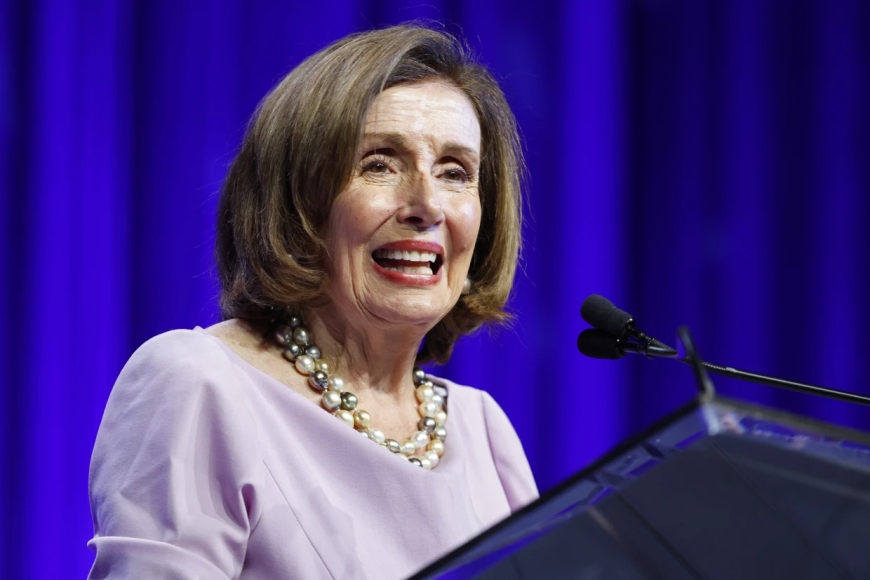Pelosi's Strategic Maneuvering Leads to Biden's Campaign Withdrawal

Former House Speaker Nancy Pelosi, a Democrat from San Francisco, played a pivotal role in President Joe Biden’s decision to withdraw from his re-election campaign, according to multiple sources. Pelosi, who stepped down from her leadership role nearly 18 months ago, leveraged her extensive influence within the Democratic Party to guide Biden towards this significant decision.
Despite no longer being part of the official Democratic leadership, Pelosi remained a central figure in the political machinations behind Biden's exit. Senate Majority Leader Chuck Schumer and House Minority Leader Hakeem Jeffries, both from New York, also communicated party concerns to Biden. However, insiders credit Pelosi with persistently keeping the issue alive whenever momentum waned.
Pelosi's efforts intensified following Biden's widely criticized debate performance last month. While Schumer and Jeffries maintained a low profile to avoid provoking Biden, Pelosi operated more openly. She reached out to numerous lawmakers, former colleagues, and Democratic donors, encouraging them to voice their concerns. Pelosi advised vulnerable lawmakers to "speak their conscience," leading to a surge of public calls for Biden to step down, culminating in 13 congressional Democrats urging his withdrawal last Friday.
A senior Democratic aide described Pelosi as a "master political tactician," emphasizing her ability to steer the party discreetly yet effectively. Throughout the ordeal, Pelosi refrained from publicly demanding Biden's exit but used strategic media appearances to apply pressure. Her appearance on MSNBC’s “Morning Joe” and private conversations with Biden underscored the potential risks of his continued candidacy, particularly the possibility of significant losses in the House and Senate.
Pelosi's allies, including Representatives Adam Schiff, Jared Huffman, and Zoe Lofgren, played key roles in reviving the push for Biden's withdrawal following a brief stall in momentum due to a national crisis. Schiff, a prominent critic of Donald Trump and favored candidate for the California Senate seat, publicly called for Biden to step aside, amplifying Pelosi's behind-the-scenes efforts.
Pelosi’s long-standing connections and political acumen were evident as she navigated the delicate situation. A Democratic lawmaker attributed half of the responsibility for Biden’s decision to Pelosi, highlighting her influential role. Pelosi’s strategic guidance was crucial in ensuring that Biden made the final decision to bow out, thereby avoiding a more direct confrontation that could have entrenched his resolve to stay in the race.
Biden’s decision to withdraw was met with mixed reactions. Pelosi praised Biden as a patriotic leader whose legacy would be remembered for his vision and values. Biden, in turn, endorsed Vice President Kamala Harris as his successor, a move quickly supported by other party luminaries such as Bill and Hillary Clinton, Rep. James Clyburn, and progressive Rep. Alexandria Ocasio-Cortez.
However, Pelosi, Schumer, and Jeffries have yet to endorse Harris officially. Pelosi’s influence could be decisive in securing Harris's nomination or potentially aiding a rival candidate at the Democratic National Convention in Chicago. Governor Gavin Newsom of California and other prominent Democrats have already endorsed Harris, reflecting the party's immediate shift towards her candidacy.
Despite the strategic maneuvering, some Democrats remain concerned about the potential fallout. The abrupt shift in the presidential race has left uncertainties, with fears that Republicans might litigate to keep Biden on the ballot, potentially leading to a protracted legal battle reminiscent of the 2000 election. As the Democratic Party navigates this transition, Pelosi’s continued political leadership will be critical in shaping the path forward and ensuring party unity in the upcoming election













































